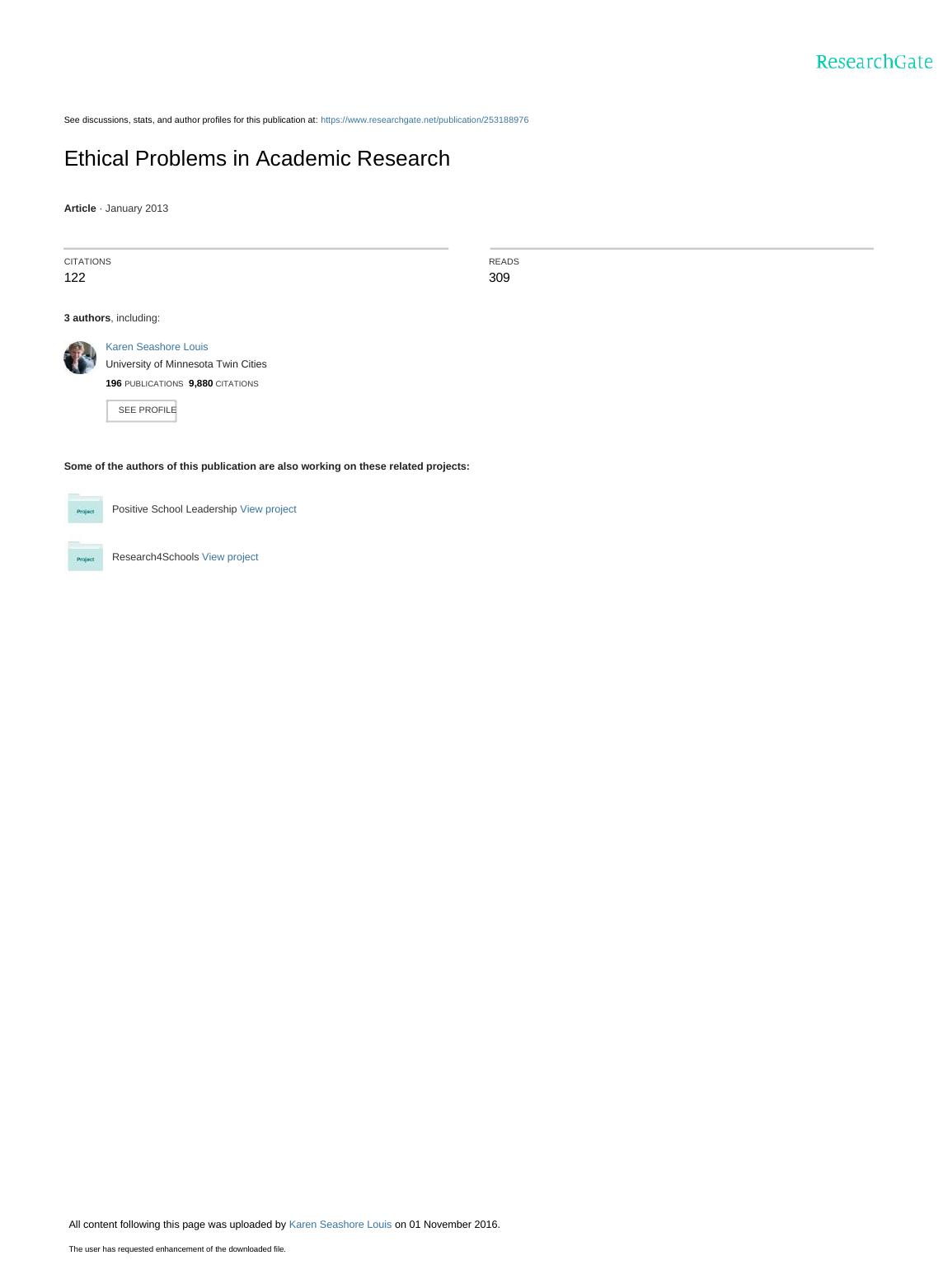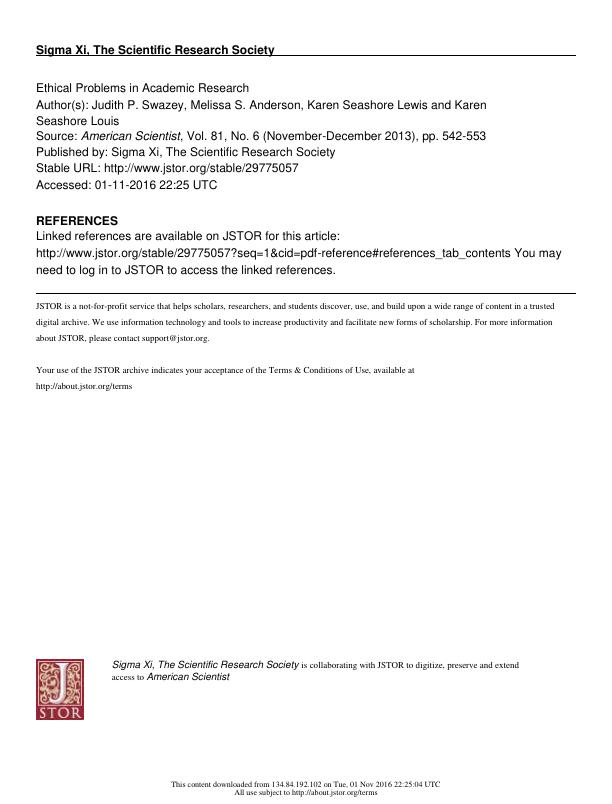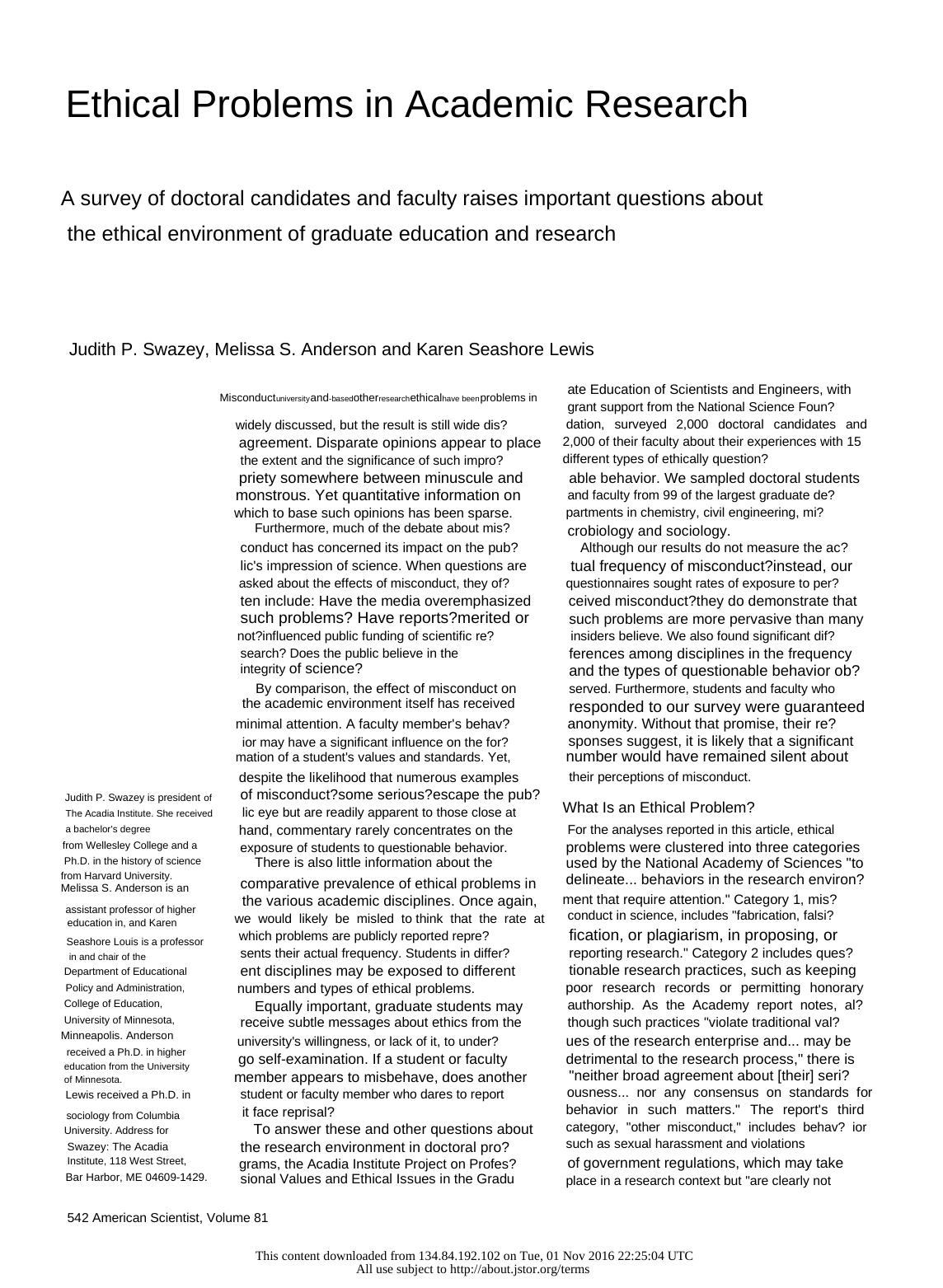Ethical Problems in Academic Research
Added on 2022-12-12
15 Pages7906 Words284 Views
See discussions, stats, and author profiles for this publication at: https://www.researchgate.net/publication/253188976
Ethical Problems in Academic Research
Article · January 2013
CITATIONS READS
122 309
3 authors, including:
Karen Seashore Louis
University of Minnesota Twin Cities
196 PUBLICATIONS 9,880 CITATIONS
SEE PROFILE
Some of the authors of this publication are also working on these related projects:
Positive School Leadership View project
Research4Schools View project
All content following this page was uploaded by Karen Seashore Louis on 01 November 2016.
The user has requested enhancement of the downloaded file.
Ethical Problems in Academic Research
Article · January 2013
CITATIONS READS
122 309
3 authors, including:
Karen Seashore Louis
University of Minnesota Twin Cities
196 PUBLICATIONS 9,880 CITATIONS
SEE PROFILE
Some of the authors of this publication are also working on these related projects:
Positive School Leadership View project
Research4Schools View project
All content following this page was uploaded by Karen Seashore Louis on 01 November 2016.
The user has requested enhancement of the downloaded file.

Sigma Xi, The Scientific Research Society
Ethical Problems in Academic Research
Author(s): Judith P. Swazey, Melissa S. Anderson, Karen Seashore Lewis and Karen
Seashore Louis
Source: American Scientist, Vol. 81, No. 6 (November-December 2013), pp. 542-553
Published by: Sigma Xi, The Scientific Research Society
Stable URL: http://www.jstor.org/stable/29775057
Accessed: 01-11-2016 22:25 UTC
REFERENCES
Linked references are available on JSTOR for this article:
http://www.jstor.org/stable/29775057?seq=1&cid=pdf-reference#references_tab_contents You may
need to log in to JSTOR to access the linked references.
JSTOR is a not-for-profit service that helps scholars, researchers, and students discover, use, and build upon a wide range of content in a trusted
digital archive. We use information technology and tools to increase productivity and facilitate new forms of scholarship. For more information
about JSTOR, please contact support@jstor.org.
Your use of the JSTOR archive indicates your acceptance of the Terms & Conditions of Use, available at
http://about.jstor.org/terms
Sigma Xi, The Scientific Research Society is collaborating with JSTOR to digitize, preserve and extend
access to American Scientist
This content downloaded from 134.84.192.102 on Tue, 01 Nov 2016 22:25:04 UTC
All use subject to http://about.jstor.org/terms
Ethical Problems in Academic Research
Author(s): Judith P. Swazey, Melissa S. Anderson, Karen Seashore Lewis and Karen
Seashore Louis
Source: American Scientist, Vol. 81, No. 6 (November-December 2013), pp. 542-553
Published by: Sigma Xi, The Scientific Research Society
Stable URL: http://www.jstor.org/stable/29775057
Accessed: 01-11-2016 22:25 UTC
REFERENCES
Linked references are available on JSTOR for this article:
http://www.jstor.org/stable/29775057?seq=1&cid=pdf-reference#references_tab_contents You may
need to log in to JSTOR to access the linked references.
JSTOR is a not-for-profit service that helps scholars, researchers, and students discover, use, and build upon a wide range of content in a trusted
digital archive. We use information technology and tools to increase productivity and facilitate new forms of scholarship. For more information
about JSTOR, please contact support@jstor.org.
Your use of the JSTOR archive indicates your acceptance of the Terms & Conditions of Use, available at
http://about.jstor.org/terms
Sigma Xi, The Scientific Research Society is collaborating with JSTOR to digitize, preserve and extend
access to American Scientist
This content downloaded from 134.84.192.102 on Tue, 01 Nov 2016 22:25:04 UTC
All use subject to http://about.jstor.org/terms

Ethical Problems in Academic Research
A survey of doctoral candidates and faculty raises important questions about
the ethical environment of graduate education and research
Judith P. Swazey, Melissa S. Anderson and Karen Seashore Lewis
Misconductuniversityand-basedotherresearchethicalhave beenproblems in
widely discussed, but the result is still wide dis?
agreement. Disparate opinions appear to place
the extent and the significance of such impro?
priety somewhere between minuscule and
monstrous. Yet quantitative information on
which to base such opinions has been sparse.
Furthermore, much of the debate about mis?
conduct has concerned its impact on the pub?
lic's impression of science. When questions are
asked about the effects of misconduct, they of?
ate Education of Scientists and Engineers, with
grant support from the National Science Foun?
dation, surveyed 2,000 doctoral candidates and
2,000 of their faculty about their experiences with 15
different types of ethically question?
able behavior. We sampled doctoral students
and faculty from 99 of the largest graduate de?
partments in chemistry, civil engineering, mi?
crobiology and sociology.
Although our results do not measure the ac?
tual frequency of misconduct?instead, our
questionnaires sought rates of exposure to per?
Judith P. Swazey is president of
The Acadia Institute. She received
a bachelor's degree
from Wellesley College and a
Ph.D. in the history of science
from Harvard University.
Melissa S. Anderson is an
assistant professor of higher
education in, and Karen
Seashore Louis is a professor
in and chair of the
Department of Educational
Policy and Administration,
College of Education,
University of Minnesota,
Minneapolis. Anderson
received a Ph.D. in higher
education from the University
of Minnesota.
Lewis received a Ph.D. in
sociology from Columbia
University. Address for
Swazey: The Acadia
Institute, 118 West Street,
Bar Harbor, ME 04609-1429.
ten include: Have the media overemphasized
such problems? Have reports?merited or
not?influenced public funding of scientific re?
search? Does the public believe in the
integrity of science?
By comparison, the effect of misconduct on
the academic environment itself has received
minimal attention. A faculty member's behav?
ior may have a significant influence on the for?
mation of a student's values and standards. Yet,
despite the likelihood that numerous examples
of misconduct?some serious?escape the pub?
lic eye but are readily apparent to those close at
hand, commentary rarely concentrates on the
exposure of students to questionable behavior.
There is also little information about the
comparative prevalence of ethical problems in
the various academic disciplines. Once again,
we would likely be misled to think that the rate at
which problems are publicly reported repre?
sents their actual frequency. Students in differ?
ent disciplines may be exposed to different
numbers and types of ethical problems.
Equally important, graduate students may
receive subtle messages about ethics from the
university's willingness, or lack of it, to under?
go self-examination. If a student or faculty
member appears to misbehave, does another
student or faculty member who dares to report
it face reprisal?
To answer these and other questions about
the research environment in doctoral pro?
grams, the Acadia Institute Project on Profes?
sional Values and Ethical Issues in the Gradu
ceived misconduct?they do demonstrate that
such problems are more pervasive than many
insiders believe. We also found significant dif?
ferences among disciplines in the frequency
and the types of questionable behavior ob?
served. Furthermore, students and faculty who
responded to our survey were guaranteed
anonymity. Without that promise, their re?
sponses suggest, it is likely that a significant
number would have remained silent about
their perceptions of misconduct.
What Is an Ethical Problem?
For the analyses reported in this article, ethical
problems were clustered into three categories
used by the National Academy of Sciences "to
delineate... behaviors in the research environ?
ment that require attention." Category 1, mis?
conduct in science, includes "fabrication, falsi?
fication, or plagiarism, in proposing, or
reporting research." Category 2 includes ques?
tionable research practices, such as keeping
poor research records or permitting honorary
authorship. As the Academy report notes, al?
though such practices "violate traditional val?
ues of the research enterprise and... may be
detrimental to the research process," there is
"neither broad agreement about [their] seri?
ousness... nor any consensus on standards for
behavior in such matters." The report's third
category, "other misconduct," includes behav? ior
such as sexual harassment and violations
of government regulations, which may take
place in a research context but "are clearly not
542 American Scientist, Volume 81
This content downloaded from 134.84.192.102 on Tue, 01 Nov 2016 22:25:04 UTC
All use subject to http://about.jstor.org/terms
A survey of doctoral candidates and faculty raises important questions about
the ethical environment of graduate education and research
Judith P. Swazey, Melissa S. Anderson and Karen Seashore Lewis
Misconductuniversityand-basedotherresearchethicalhave beenproblems in
widely discussed, but the result is still wide dis?
agreement. Disparate opinions appear to place
the extent and the significance of such impro?
priety somewhere between minuscule and
monstrous. Yet quantitative information on
which to base such opinions has been sparse.
Furthermore, much of the debate about mis?
conduct has concerned its impact on the pub?
lic's impression of science. When questions are
asked about the effects of misconduct, they of?
ate Education of Scientists and Engineers, with
grant support from the National Science Foun?
dation, surveyed 2,000 doctoral candidates and
2,000 of their faculty about their experiences with 15
different types of ethically question?
able behavior. We sampled doctoral students
and faculty from 99 of the largest graduate de?
partments in chemistry, civil engineering, mi?
crobiology and sociology.
Although our results do not measure the ac?
tual frequency of misconduct?instead, our
questionnaires sought rates of exposure to per?
Judith P. Swazey is president of
The Acadia Institute. She received
a bachelor's degree
from Wellesley College and a
Ph.D. in the history of science
from Harvard University.
Melissa S. Anderson is an
assistant professor of higher
education in, and Karen
Seashore Louis is a professor
in and chair of the
Department of Educational
Policy and Administration,
College of Education,
University of Minnesota,
Minneapolis. Anderson
received a Ph.D. in higher
education from the University
of Minnesota.
Lewis received a Ph.D. in
sociology from Columbia
University. Address for
Swazey: The Acadia
Institute, 118 West Street,
Bar Harbor, ME 04609-1429.
ten include: Have the media overemphasized
such problems? Have reports?merited or
not?influenced public funding of scientific re?
search? Does the public believe in the
integrity of science?
By comparison, the effect of misconduct on
the academic environment itself has received
minimal attention. A faculty member's behav?
ior may have a significant influence on the for?
mation of a student's values and standards. Yet,
despite the likelihood that numerous examples
of misconduct?some serious?escape the pub?
lic eye but are readily apparent to those close at
hand, commentary rarely concentrates on the
exposure of students to questionable behavior.
There is also little information about the
comparative prevalence of ethical problems in
the various academic disciplines. Once again,
we would likely be misled to think that the rate at
which problems are publicly reported repre?
sents their actual frequency. Students in differ?
ent disciplines may be exposed to different
numbers and types of ethical problems.
Equally important, graduate students may
receive subtle messages about ethics from the
university's willingness, or lack of it, to under?
go self-examination. If a student or faculty
member appears to misbehave, does another
student or faculty member who dares to report
it face reprisal?
To answer these and other questions about
the research environment in doctoral pro?
grams, the Acadia Institute Project on Profes?
sional Values and Ethical Issues in the Gradu
ceived misconduct?they do demonstrate that
such problems are more pervasive than many
insiders believe. We also found significant dif?
ferences among disciplines in the frequency
and the types of questionable behavior ob?
served. Furthermore, students and faculty who
responded to our survey were guaranteed
anonymity. Without that promise, their re?
sponses suggest, it is likely that a significant
number would have remained silent about
their perceptions of misconduct.
What Is an Ethical Problem?
For the analyses reported in this article, ethical
problems were clustered into three categories
used by the National Academy of Sciences "to
delineate... behaviors in the research environ?
ment that require attention." Category 1, mis?
conduct in science, includes "fabrication, falsi?
fication, or plagiarism, in proposing, or
reporting research." Category 2 includes ques?
tionable research practices, such as keeping
poor research records or permitting honorary
authorship. As the Academy report notes, al?
though such practices "violate traditional val?
ues of the research enterprise and... may be
detrimental to the research process," there is
"neither broad agreement about [their] seri?
ousness... nor any consensus on standards for
behavior in such matters." The report's third
category, "other misconduct," includes behav? ior
such as sexual harassment and violations
of government regulations, which may take
place in a research context but "are clearly not
542 American Scientist, Volume 81
This content downloaded from 134.84.192.102 on Tue, 01 Nov 2016 22:25:04 UTC
All use subject to http://about.jstor.org/terms

Figure 1. Misconduct and other ethical problems in university-based research have been widely debated, but discussion has
focused primarily on public perceptions and external impacts. Survey data, however, indicate that misconduct and ethically
questionable behavior may have profound effects within the academic community on the climate of learning
and the transmission of values and standards. In the myth that originated the term mentor, Odysseus entrusted the ed?
ucation of his son, Telemachus, to the care of Mentor. Student and teacher are portrayed here by Giovanni Battista Tlepolo, in
the 18th-century painting 'Telemachus and Mentor," now displayed at the Rijksmuseum in Amsterdam.
1993 November-December 543
This content downloaded from 134.84.192.102 on Tue, 01 Nov 2016 22:25:04 UTC
All use subject to http://about.jstor.org/terms
focused primarily on public perceptions and external impacts. Survey data, however, indicate that misconduct and ethically
questionable behavior may have profound effects within the academic community on the climate of learning
and the transmission of values and standards. In the myth that originated the term mentor, Odysseus entrusted the ed?
ucation of his son, Telemachus, to the care of Mentor. Student and teacher are portrayed here by Giovanni Battista Tlepolo, in
the 18th-century painting 'Telemachus and Mentor," now displayed at the Rijksmuseum in Amsterdam.
1993 November-December 543
This content downloaded from 134.84.192.102 on Tue, 01 Nov 2016 22:25:04 UTC
All use subject to http://about.jstor.org/terms

End of preview
Want to access all the pages? Upload your documents or become a member.
